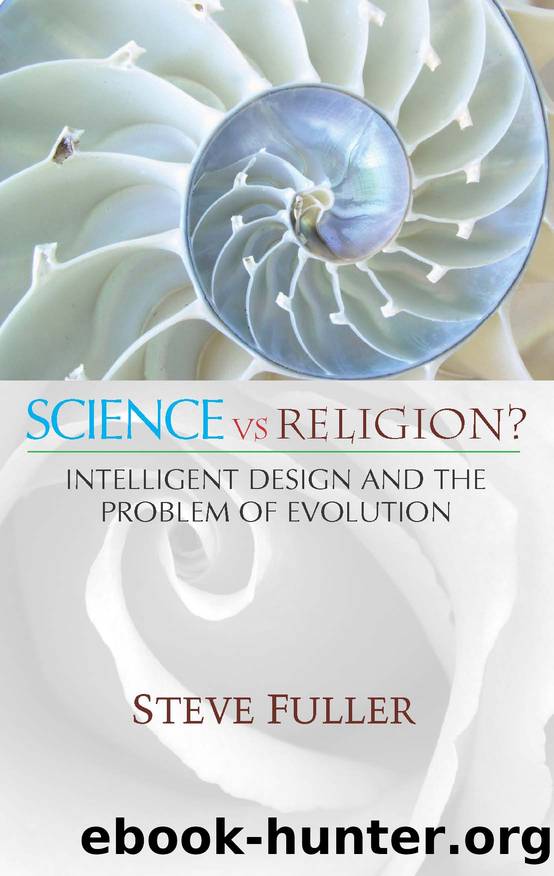Science vs. Religion by Steve Fuller

Author:Steve Fuller
Language: eng
Format: epub
Publisher: Polity Press
Published: 2012-02-22T00:00:00+00:00
4
America as a Legal Battleground
1. Expertise on the Nature of Science
2. Supernaturalism as Figment and Fact in the Naturalistic Imagination
3. Philosophical Resistance to Scientific Naturalism
4. Americaâs Unique Legal and Political Culture
5. Conclusion: The Threat Posed by Intelligent Design
1. Expertise on the Nature of Science
In February 2005, the Thomas More Law Center of Ann Arbor, Michigan, asked me to serve as a ârebuttal witnessâ for the defense in Kitzmiller v. Dover Area School District, a trial scheduled to begin early in the autumn of that year, which would be the first case to test the eligibility of âintelligent design theoryâ (IDT) for inclusion alongside the neo-Darwinian theory of evolution in high school biology classes. As a rebuttal witness, my charge was to contradict the claims made by the plaintiffsâ witnesses, all of whom were seasoned veterans of related trials involving creationism. Their opinions were already compiled (Dembski and Ruse 2004) and their biographies featured on the website of the plaintiffsâ legal team, the American Civil Liberties Union (ACLU). I decided to participate without knowing this background but simply after having read the expert witness reports as filed by the plaintiffsâ lawyers. These struck me as based on tendentious understandings of the nature of science that would not have survived scrutiny on an informed listserv like HOPOS-L (dedicated to the history of the philosophy of science), let alone the peer review process of a relevant journal. I concluded that the plaintiffsâ experts simply took advantage of their âexpertâ status to offer their sincerely held but professionally uncensored opinions.
My critical eye was clearly informed by knowledge gained from science and technology studies, since, while having written on IDTâs struggle for scientific legitimacy (Fuller 1998b), I am not an advocate of â or expert in â either IDT or, for that matter, neo-Darwinism. But my prima facie marginality to the positions under dispute did not deter me. Indeed, I may be the first person to declare under oath that someone trained in the history, philosophy, and sociology of science â that is, science and technology studies (which I glossed as âsocial epistemologyâ during the trial) â can better evaluate the scientific standing of a field of inquiry than someone formally trained in science.
Of course, scientists trained in particular fields are better placed to issue judgments about the epistemic standing of claims and practices in those fields. But that is different from the second-order problem of whether such fields constitute sciences. A great virtue of the US Constitution is its delegation of educational decisions to the local level, so that those who pay for the schools (through taxes) get to govern them (Fuller 2006a: 174â9). There is no educational ministry that sets a ânational curriculum,â as commonly found in much of the developed world. As long as enough students pass state-based (i.e. based in a particular US state) subject exams, the curriculum can be organized as the locals see fit â that is, until a legal challenge is raised.
Letting the locals decide science education simultaneously
Download
This site does not store any files on its server. We only index and link to content provided by other sites. Please contact the content providers to delete copyright contents if any and email us, we'll remove relevant links or contents immediately.
The Hatha Yoga Pradipika (Translated) by Svatmarama(2498)
Real Sex by Lauren F. Winner(2481)
The Holy Spirit by Billy Graham(2425)
The Secret Power of Speaking God's Word by Joyce Meyer(2257)
The Gnostic Gospels by Pagels Elaine(2034)
Devil, The by Almond Philip C(1906)
23:27 by H. L. Roberts(1895)
Jesus by Paul Johnson(1892)
The Nativity by Geza Vermes(1853)
All Things New by John Eldredge(1786)
Chosen by God by R. C. Sproul(1766)
Angels of God: The Bible, the Church and the Heavenly Hosts by Mike Aquilina(1630)
The Return of the Gods by Erich von Daniken(1578)
Angels by Billy Graham(1555)
Evidence of the Afterlife by Jeffrey Long(1463)
Knowing God by J.I. Packer(1436)
The Gnostic Gospel of St. Thomas by Tau Malachi(1414)
Victorian Sensation by James A. Secord(1410)
How To Be Born Again by Billy Graham(1407)
